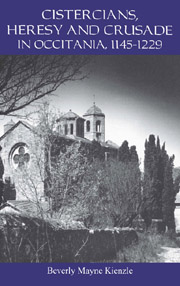Book contents
- Frontmatter
- Contents
- List of Illustrations
- List of Abbreviations
- Chronology
- Preface
- Introduction
- Appendix to Introduction Deconstructing: Close Reading, Rhetorical Criticism, and Historiography of Persecution and Heresy
- 1 The Lord's Vineyard in the Twelfth Century
- 2 Monastic Spirituality and Literature: the Domestic Vineyard
- 3 Bernard of Clairvaux, the 1143/44 Sermons and the 1145 Preaching Mission: From the Domestic to the Lord's Vineyard
- 4 Henry of Clairvaux, the 1178 and 1181 Missions, and the Campaign against the Waldensians: Driving the Foxes from the Vineyard
- 5 Innocent III's Papacy and the Crusade Years, 1198–1229: Weeding the Vineyard
- 6 Hélinand of Froidmont and the Events of 1229: Planting Virtues in the Vineyard
- Conclusion
- Bibliography
- Index
- Title in the series
2 - Monastic Spirituality and Literature: the Domestic Vineyard
Published online by Cambridge University Press: 12 September 2012
- Frontmatter
- Contents
- List of Illustrations
- List of Abbreviations
- Chronology
- Preface
- Introduction
- Appendix to Introduction Deconstructing: Close Reading, Rhetorical Criticism, and Historiography of Persecution and Heresy
- 1 The Lord's Vineyard in the Twelfth Century
- 2 Monastic Spirituality and Literature: the Domestic Vineyard
- 3 Bernard of Clairvaux, the 1143/44 Sermons and the 1145 Preaching Mission: From the Domestic to the Lord's Vineyard
- 4 Henry of Clairvaux, the 1178 and 1181 Missions, and the Campaign against the Waldensians: Driving the Foxes from the Vineyard
- 5 Innocent III's Papacy and the Crusade Years, 1198–1229: Weeding the Vineyard
- 6 Hélinand of Froidmont and the Events of 1229: Planting Virtues in the Vineyard
- Conclusion
- Bibliography
- Index
- Title in the series
Summary
When the Cistercians stepped into the Lord's vineyard, they carried with them patterns of monastic thought, writing and preaching. Immersed in the Scriptures and the Rule of Benedict, the white monks viewed the surrounding world through the lens of the domestic vineyard, its spirituality and symbolist mentality. Imbued with reforming zeal, the Cistercians sought to bring dissident Christians into conformity with the monastic vision of the proper arrangement for society: to convert dwellers in the spiritual Babylon of the world into aspirants toward a heavenly Jerusalem where monks occupied the highest ranks.
Two types of sources inform our study of monastic spirituality: religious experience and written texts. One section of this chapter will be devoted to religious experience as prescribed in the Rule of Benedict, and two to dealing with written texts: first, exegesis, and second, other monastic literature. To comprehend monastic exegesis and literature, one must first understand the precepts of the Rule of Benedict, which represents the culmination of oral and written monastic tradition and provides the experiential program for the monastic life. From the experience prescribed in the Rule, we shall turn to the genres of monastic literature, inseparable from oral tradition and lived experience.
The Rule of Benedict
The Rule of Benedict, attributed to Benedict of Nursia (c. 480–c. 550), came to dominate Western monasticism during the Carolingian era. The Cistercian Order aspired to return to the purity of Benedict's Rule, which they felt had been lost with the growth of Cluniac monasticism. The twelfth-century Dialogue between a Cluniac and a Cistercian reflects the white monks' reproaches of their Benedictine brothers' indulgence in practices from fine eating to teaching poetry. The Rule draws a theology and spirituality from the Bible and prescribes a way of life rooted in a simple reading of the Scriptures. In that sense, the Rule grounds a lived exegesis, that is, the integration of the Bible's meaning into every possible aspect of daily life. The Rule also rests on the writings of the early monastic Fathers5 and so reflects the patristic tradition.
- Type
- Chapter
- Information
- Cistercians, Heresy and Crusade in Occitania, 1145–1229Preaching in the Lord's Vineyard, pp. 56 - 77Publisher: Boydell & BrewerPrint publication year: 2001



